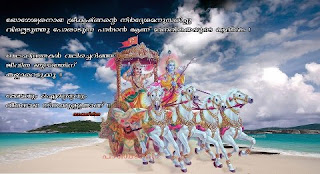9: The Majesty of God-Consciousness : 2.
The Teachings of the Bhagavadgita :
The peregrination of the individual consciousness through the various stages, which were touched upon in our scheme of cosmological studies, is an interesting part of philosophical studies. Briefly it was told us that the last thought decides the future, and I mentioned that the last thought is not an isolated link but a culmination, a fruit, a maturity, the finality of the total psychological operations of the individual throughout one' s life. So it is not a chronologically disassociated last thought, but a logical development of the entire thought process, fructifying in this total thought. We can describe it only in that way – the total thought, and not one among the many thoughts.
This complete thought would be the factor that determines the future of the soul. Whatever one aspires for, that one shall attain to.
Yam yam vapi smaran bhavam tyajatyante kalevaram, tam tamevaiti (Gita 8.6).
This is a great theme in the studies of the field of psychology, including abnormal psychology, we may say. The soul is supposed to depart from this world, shedding this body, and move in certain directions towards the destination where its unfulfilled longings can find fulfilment and fructification. The law which governs the universe seems to be so precise, mathematical, and exact in its functions that it does not ignore anyone – it does not set aside the longing of even a single psychological operation. Every thought has to fulfil itself – if not today, at least tomorrow. So there is an automatic action taking place in this computer system of the cosmos, and there is no need for another operator behind it. It is self-operating. And this system seems to be so exact and inexorable that preference seems to be given to the strongest of thoughts and feelings, and the lesser ones receive attention later on, at the proper time and in the proper place.
The Bhagavadgita does not go into great details in this subject, as much as we have in the Upanishads, for instance. There is a brief statement of the exit of the soul. 'The departure of the soul from the body,' is the way we describe things generally, as if we are encaged in this body and we are not this body. As a person may leave his house, we, the real individuals lodged in this tabernacle, leave it one day in order that we may enter a new house which is already constructed for us by the architect who is paid for by God Himself; and already the house is built, the foundation is dug and the entire structure is complete even before we leave this body. Such wondrous mechanism operates in the universe.
But where do we go? – is a crucial question. "Where do I go, and where does anything go?" We will not be taken to that place which we have not desired in our mind, or rather which does not follow as a natural consequence of our thoughts, feelings and actions. The Bhagavadgita will tell us at another place that the consequences of our deeds are not entirely in our hands. And the deed so-called is not merely what we do with our hands and feet, but also what we think and feel and will; all these are actions, perhaps they are real actions. Our deep-seated longings are our actions, more than what our feet do or hands do. And many times our longings are different from the shape taken by our physical activities. Social conditions and many other factors prevent inward longings from manifesting themselves in outward form, and we live a repressed life. But this repression is something like burying a seed in the ground, which will sprout itself forth one day when there is rainfall and a conducive atmosphere is manifest.
To be continued ...
.jpg)
.jpg)
.jpg)


Comments
Post a Comment